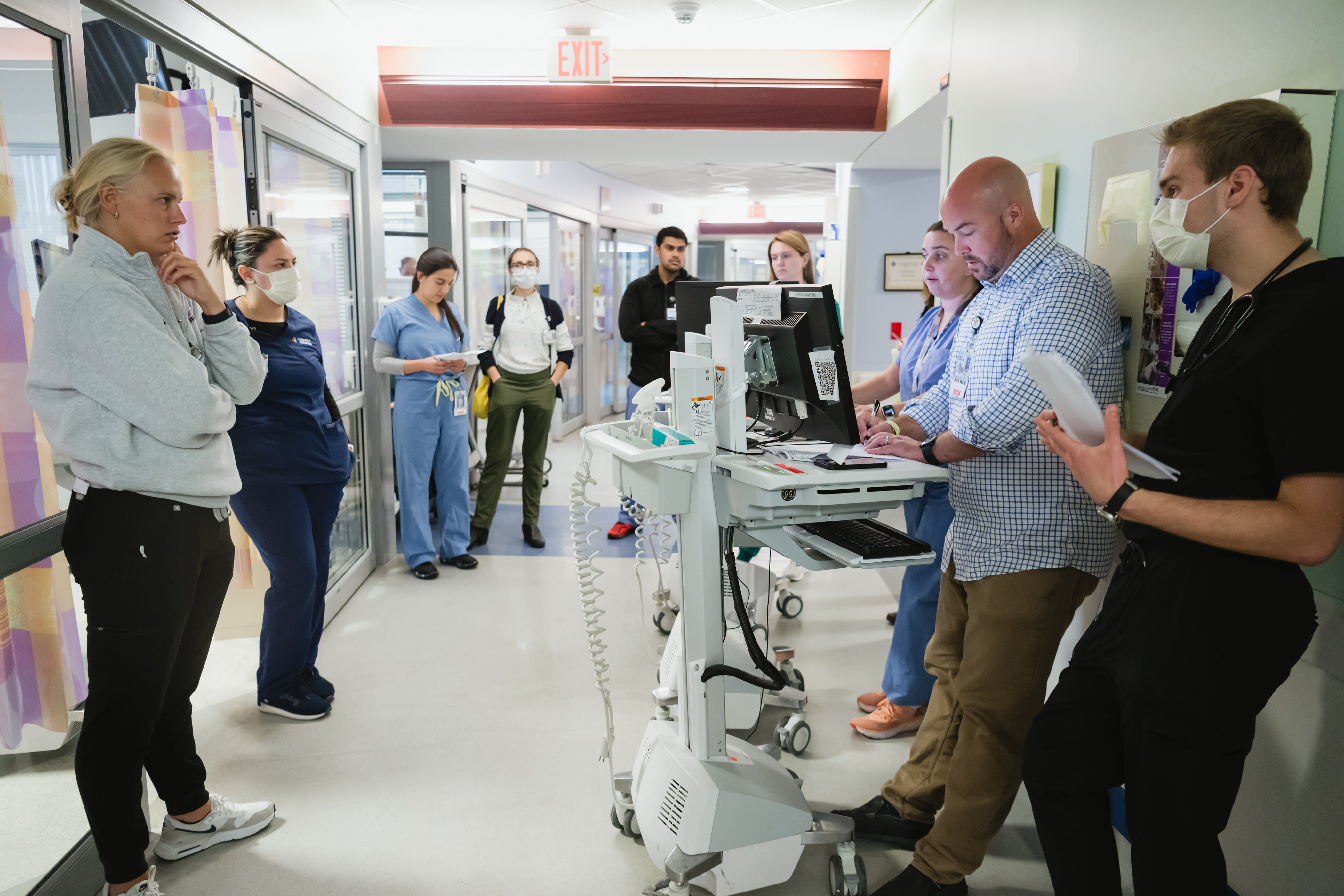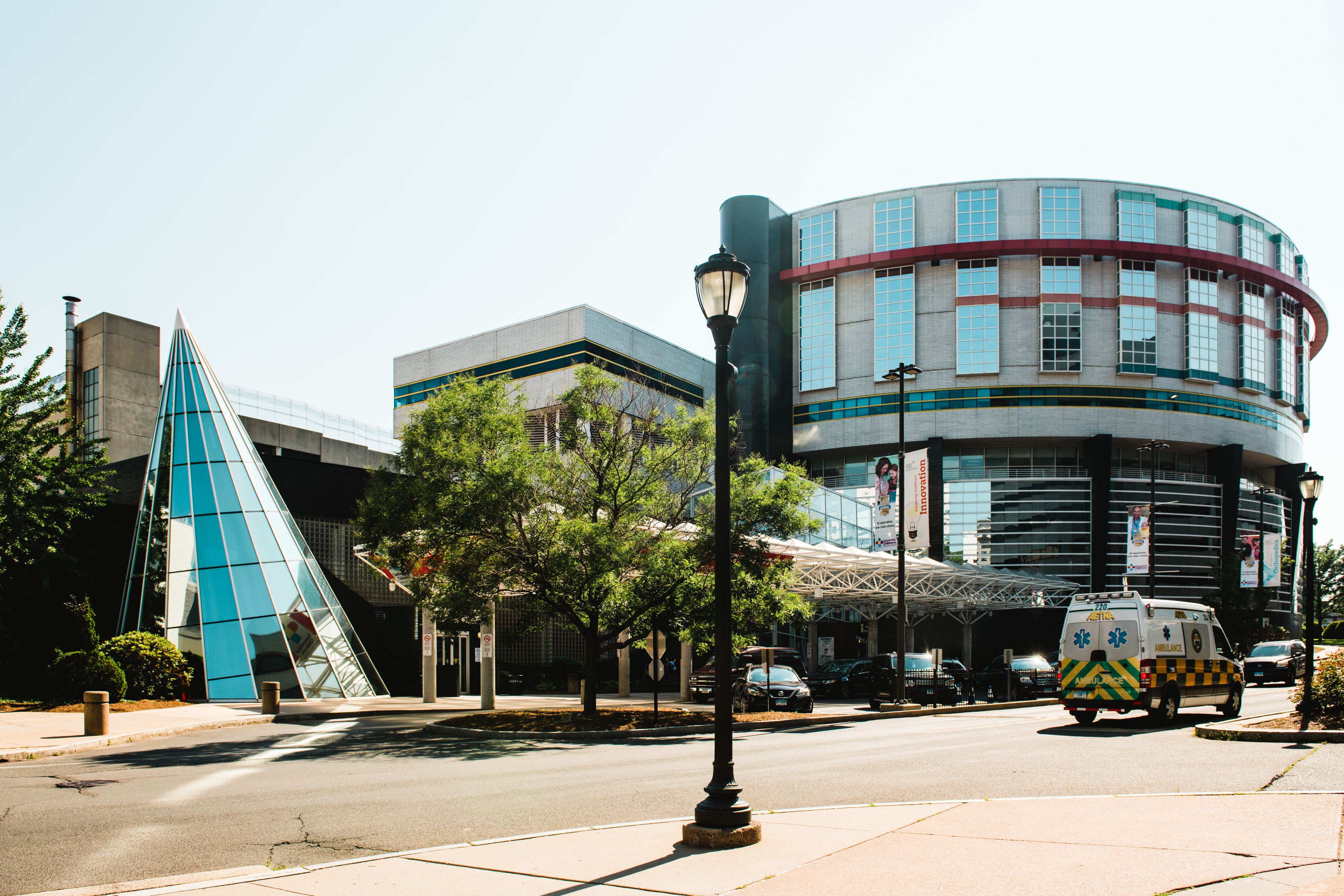Connecticut Children’s is the main teaching hospital for the University of Connecticut School of Medicine Department of Pediatrics. We are an an independent children’s health system with our flagship Medical Center in Hartford, and more than 35 locations across the region. Over the course of a three-year residency program, residents receive superior education and training that combines hands-on, supervised patient care experiences, protected didactics and online curricular resources. Our mission is to train well rounded physicians who will improve the health of children and adolescents through clinical excellence, research, teaching, community involvement, and advocacy.
About Connecticut Children's

Program at a Glance
- 22 residents selected per year
- 230 faculty members
- Resident-focused training
- Individualized curriculum with well-developed pathways
- Strong advocacy and community involvement programs
- Several simulation courses and workshops available
- Intensive exposure and training opportunities in a variety of settings
- Four concentrations (community health, acute care, primary care, subspecialty care) with 22 pathways
- Collaborative medical community
- Well-rounded experience to prepare students for any career in pediatrics
- Learning environment promotes wellness and reduces burnout while also focusing on advocacy, quality improvement and safety
- Juan C. Salazar, MD, MPH, Chair, Department of Pediatrics, Infectious Diseases & Immunology
- Stewart Mackie, MD, Program Director, Cardiology
- Jennifer Haile, MD, Associate Program Director, Primary Care
- Eric Hoppa, MD, Associate Program Director, Emergency Medicine
- Jonah Mandell, DO, Associate Program Director, Urgent Care
- Sara Sanders, MD, Associate Program Director, Critical Care Medicine
- Sharon Smith, MD, Associate Program Director, Emergency Medicine
- CAresti [at] connecticutchildrens.org (Crista Aresti), Program Coordinator
- TFlores [at] connecticutchildrens.org (Thalia Flores), Program Coordinator
- mcuster [at] connecticutchildrens.org (Marianne Custer), Administrative Director Medical Education
- Edwin L. Zalneraitis, MD, Graduate Medical Education Advisor to the Chair of Pediatrics, Neurology
- 4 weeks of vacation per year
- Financial and scheduling support for medical meetings and conferences
- $1,750 stipend for educational expenses, including electronics
- Strong administrative support including Program Director, 4 Associate Directors, 3 Chief Residents and 2 Coordinators
- Away opportunities available, including international health
- Tuition support for other degree programs available
- Diverse population and opportunities for continuity clinic
- Strong benefits package from the University of Connecticut
Full benefits and payroll information available on the University of Connecticut School of Medicine's website.
- Protected didactics
- Full ABP content specifications covered
- Community longitudinal experience
- Residents fully involved in program governance
- Individualized, transitional curriculum including 22 pathways within 4 concentrations
- Full-time academic hospitalist staff supervision
- Simulation courses and workshops built into curriculum, including PALS, NRP and resuscitation sessions
- Weekly evidence based medicine conference, including journal clubs, quality and safety conference, and resident lead case conferences
- Morning report
- Call free blocks during your second and third year to allow time for away rotation experiences
- Board Pass Rate: 93%
| PL-1 | PL-2 | PL-3 |
|---|---|---|
| Inpatient Floor (1 week of nights) | Inpatient Floor (2 weeks of nights) | Inpatient Floor (0-2 weeks of nights) |
| Inpatient Floor (1 week of nights) | Inpatient Floor (2 weeks of nights) | Inpatient Floor (0-2 weeks of nights) |
| Inpatient Floor (1 week of nights) | PICU (1 week of nights) | Inpatient Floor (0-2 weeks of nights) |
| Inpatient Floor (1 week of nights) | PICU (1 week of nights) | Inpatient Floor or PICU |
| Newborn Nursery | NICU | Teaching Residents |
| NICU | Emergency Department | Emergency Department |
| Emergency Department | Adolescent Medicine | Ambulatory Pediatrics |
| Ambulatory Pediatrics | Ambulatory Pediatrics | Discretionary Experience (Elective) |
| Developmental-Behavioral Pediatrics | Call Free Discretionary Experience (Elective) | Discretionary Experience (Elective) |
| Discretionary Experience (Elective) | Discretionary Experience (Elective) | Discretionary Experience (Elective) |
| Discretionary Experience (Elective) | Discretionary Experience (Elective) | Discretionary Experience (Elective) |
| Discretionary Experience (Elective) | Discretionary Experience (Elective) | Discretionary Experience (Elective) |
All residents complete a required amount of rotations within ambulatory, inpatient and subspecialty care. A full 24 weeks are dedicated to individual curriculum via a “pathway” model to prepare for future career goals. The pathway model allows residents to choose an educational experience that best matches their future career goals. The program includes several established pathways, but residents are welcome to create their own.
General Pediatrics
The general pediatrics pathway prepares residents for academic and community practice. We have several established educational units to help residents prepare to enter primary care including advanced practice and population health rotations, rural medicine rotations and primary care research rotations.
Acute Care
The acute care pathway is designed to help residents interested in intensive care, hospitalist and emergency medicine prepare for fellowship and practice. A wide array of educational units are available to help residents prepare clinically and engage in research.
Subspecialty Practice
The subspecialty pathway is designed to help residents interested in all pediatric subspecialists. Educational units are offered in all departments for which fellowships are available on a national level. Educational units are focused on building clinical skills, engaging in research and academic development.
Global Health
The Center for Global Health is an institution-wide program supporting the activities of faculty, residents and staff who are committed to sustainable capacity-building activities to improve the care of children in resource-limited setting.
A major focus of the CGH is to provide opportunities for residents to participate in these activities under the supervision of Connecticut Children’s faculty. Current pediatric resident opportunities include multi-week electives at St. Damiens Hospital in Port-au-Prince, Haiti, Hospital Bernard Mevs in Port-au-Prince, Haiti, the NICE Institute in Hyderabad, India and the University Teaching Hospital of Kigali in Kigali, Rwanda. All of these programs are examples of sustainable programs in which faculty and learners from Connecticut Children’s collaborate with partners in order to improve the health care capacity in resource-limited settings.
If you have any questions, please contact the pathway coordinator asilverman [at] connecticutchildrens.org (Adam Silverman).
Advocacy & Leadership
The Advocacy pathway offers the pediatric resident the unique opportunity to develop knowledge and skill in the areas of advocacy, community health, and public policy. As an integral program of Connecticut Children’s Office for Community Child Health, residents work closely with experts in the fields of population health, community research, policy formation and social innovation, all toward the promotion of children’s healthy development.
Connecticut Children’s Diversity, Equity and Inclusion Committee is comprised of residents, fellows, attending faculty and hospital team members who are focused on expanding the diversity, equity and inclusion within the Pediatric Residency Program to include participants from groups underrepresented in medicine (URM), and to become more representative of the populations we serve. In doing so, we hope to increase interest of URM applicants to our residency program, create an environment where URM residents feel supported and provide our patients with physician role-models.
Additionally, the University of Connecticut School of Medicine offers a Visiting Externship for Students Underrepresented in Medicine (VESUM).
We understand the importance of wellness during training and beyond. In order to help our residents learn professional and personal skills that will keep them engaged and resilient throughout their careers, we offer a variety of wellness activities.
Resident Retreats
Each year, our residents have a full day fall and spring retreat. Our retreat themes are self-care, connectedness and meaning in work.
Personal Financial Literacy Curriculum
We offer residents financial planning education that covers the spectrum of financial literacy topics addressing resident's current needs and long-term financial goals.
Our educators even help residents create a financial personal financial plan.
Professional Development
We offer four specialized professionalism sessions each year focusing on community engagement, humanism in medicine and meaning in work. The content of each session changes each year to reflect these themes.
Diversity and Inclusion
Spearheaded by our resident leaders, our program created a diversity and inclusion program to expand the diversity/inclusiveness of the residency program to be more representative of the patient population that we serve.
Holiday Observances
We offer each residents time to enjoy the holidays with their families and friends. Each resident receives 4 days of non-clinical time in addition to their 4 weeks of vacation time in observance of holidays as well as 2 days of non-clinical time to be used at Thanksgiving.
Leadership Series
Longitudinal curriculum to enhance and develop leadership skills for your career in medicine.
Wellness Committee
Resident run wellness committee to help plan different activities and initiatives to promote resident wellness.
Mentorship
Each resident is paired with a faculty mentor to discuss evaluations, career goals, and learning plans. You meet regularly with your mentor throughout residency.
A wide variety of research opportunities are available to residents within the Department of Pediatrics and elsewhere in the community and affiliated institutions.
Our program fulfills AGGME’s community health and child advocacy requirements in a unique way. Each resident will have a longitudinal experience during their three years of residency to work with different groups in our diverse community. Because of the longitudinal nature of these experience, we hope it results in authentic community partnerships. Some of these experiences include:
- Global Child Health Partnership: Directed by Connecticut Children’s Melissa Held, MD, the program serves newly arrived refugee families in Hartford in partnership with Catholic Charities. Residents create care plans, transition patient care to primary care physicians and continuity clinics, and deliver mandated health curriculum to families.
- Building Resilience Through Education: Our residents partner with Capitol Squash, an after-school program for low-income youth, in which middle- and high-school students are taught to play squash by Division I athletes at Trinity College and then receive homework help and college application assistance from our residents. Residents will also be spending time with the Boys and Girls Clubs of Greater Hartford to help them with numerous after school programs.
- Healthy Families and Growing Gardens: Our residents will provide nutritional information and support through numerous groups and venues during their community experience. These include YMCA nursery schools, going to food pantries and community kitchens with multiple partners including Fern Street Food Ministry and Hands on Hartford. We also spend time doing urban gardening in Hartford with Knox Community Gardens.
Follow our residents on Instagram.
Take a Virtual Tour

Living in Connecticut
